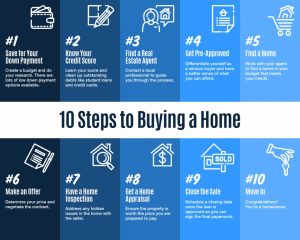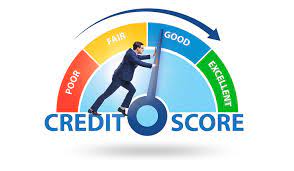Buying a home is exciting, but it can also feel stressful and confusing, especially if…

10 Steps in the Home Buying Process
Begin here with the first three!

If you’re thinking of buying a home and you’re not sure where to start, you’re not alone. Here’s a guide with 10 simple steps to follow in the home buying process. Be sure to work with a trusted real estate professional to find out the specifics of what to do in your local area.
Step 1: Save for Your Down Payment

Banks often approve people for a bigger mortgage than they need, but that doesn’t mean you have to use all of it. You know how much house you can afford, and that’s what you should stick to. But how can you figure that out? The following is a short guide the the home buying process.
Keep in mind that your total income is your gross, not net income. Gross income is what your paycheck looks like before taxes, health insurance, and other expenses are deducted. Net income is your income after those expenses have been taken out.While percentage rules aren’t set in stone, they provide good guidelines to ensure you can afford not only your mortgage payment but your other bills, too. You don’t want to overextend yourself or your finances.
“Buying a home isn’t a quick process, but it is a worthwhile one. And once you get your finances organized, you can start thinking about where you want to live.”
–Kathleen Chiras, Association Manager for National Buyers Agents Association
Step 2: Know Your Credit Score

Before you even consider where you want to live and how much house you can afford, you should ask yourself “how should I financially prepare for buying a house?”
-
Pull your credit report
Whether you have good or bad credit, you want to pull your credit report to know where you stand.
You can look at your credit report from each of the three main credit bureaus for free once a year. Go to AnnualCreditReport.com, fill out the required information to confirm your identity, and review your report. If you have problems or any issues with some accounts, you’ll find those at the top of your credit report. Take note of them so you know where to begin fixing your credit.
Even if you think your credit history is excellent and there are no adverse issues, still check your credit score and report. There could be a mistake in it. For instance, maybe you’ll find an account in collections from the public library for not returning a book. It seems small and inconsequential, but it makes a difference when you’re shopping for a mortgage.
Lenders don’t like to see borrowers with adverse accounts or any accounts in collections, so be sure to resolve those before talking to a bank about a home loan.
-
Improve your credit score
If your credit score isn’t great, you can use your credit report to find valuable information for improving your score. Your payment history is the record of all the bills you’ve paid on time. Banks prefer a history of timely payments because it means they will likely get paid on time if they loan you money. Be prepared for your potential lender to ask about any late payments. If they do, explain honestly why the payments were late and how you’re working to fix the issues. Point to your current good standing with your accounts as proof. They will hopefully take that into consideration and lend you the money.
-
Don’t take out new loans
Once you start the home buying process, try to avoid taking out new loans. Although part of your credit score relies on a good account mix, this is not the time to add new accounts to your report. Taking on new loans, even if you can technically afford them, can affect your credit score and your debt-to-income ratio.
So while you’re in the middle of checking your credit, getting pre-approved, and seeing how much home you can afford, it’s a good rule of thumb to avoid taking out any new car loans or applying for new credit cards.
-
Eliminate high-interest debt
Another quick way to improve your credit score is to pay down any outstanding debts you may have. The amount of money you owe in relation to your credit limits makes up 30% of your credit score. If you’re maxing out your credit cards and using up most of your available credit, you’ll have a lower score. Before applying to lenders for a home loan, try to pay off as much consumer debt as possible to improve your score.
If you need to find a way to get extra money so you can pay down debt, you have two options: cut back on expenses or earn more money. If you’re not sure where to start with cutting expenses, create a budget. List all of your bills, subscriptions, monthly obligations, and other debts to see where you have room to reduce the cost.
-
Set a monthly savings goal
Once you’ve pulled your credit report, repaired adverse accounts, and worked to get out of debt, it’s time to set monthly savings goals. You’ll need a down payment, ideally 20% of your home purchase price (although you can purchase a house with a lower down payment), and enough money for closing costs in order to buy a house.
In order to stay motivated to save money every month, put a picture of your dream house on the fridge. Set reminders. Work together with your spouse as accountability partners to reach your goal of homeownership. If you’re single and buying a home, find accountability through your parents, coworkers, or friends.
As far as where to keep your down payment savings, consider a high-yield online savings account, which is preferable to investing for short-term goals like buying a house. This way, the money is earning some interest while you save to buy your home.
Step 3: Find a Real Estate Agent -an expert helper in the home buying process

National Buyers Agent Association helps you decide on Why you should use a Buyer’s agent.
If you are planning to buy a home soon, the National Buyers Agent Association has a network of top-rate fiduciary buyer’s agents, and brokers. Buyer agents have well-established connections to other business professionals who can help make your move less stressful. Simply communicate your needs by filling out the online form where you can get immediate results. Also, the association manager, Kathleen Chiras, and her staff will contact you back as soon as possible. For faster process to top buyer agents, fill out the form or call 800-383-7188, Mondays through Sundays.
The Buyer Agent Search Service has a wide network of top-performing agents throughout the 50 states in the United States. It is a trusted consultation service at no cost. We specialize in suggestions of best-performing Buyer Agents. This is a FREE service to all real estate buyers or sellers. Top agents will help with understanding what it takes to with the bid on a home in a tough seller’s market. Their experience will prove highly advantagous in crafting the offer, negotiating the price, and navigating the closing.
See our next blog for steps 4-6, and the next one for steps 7-10!



